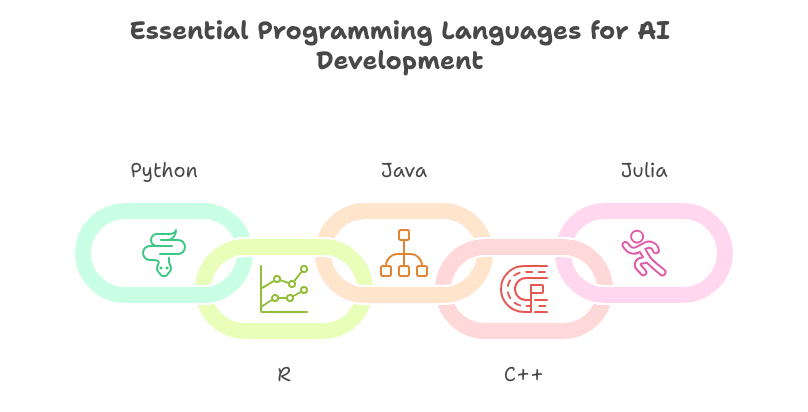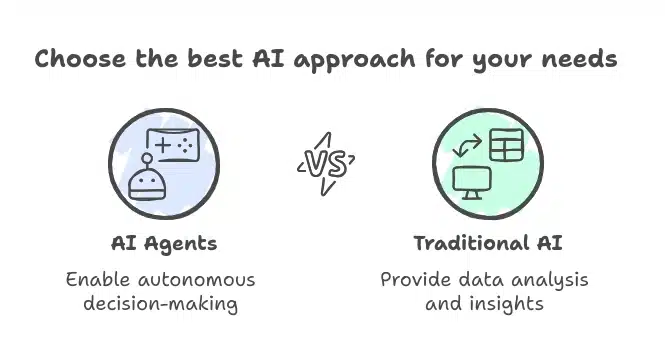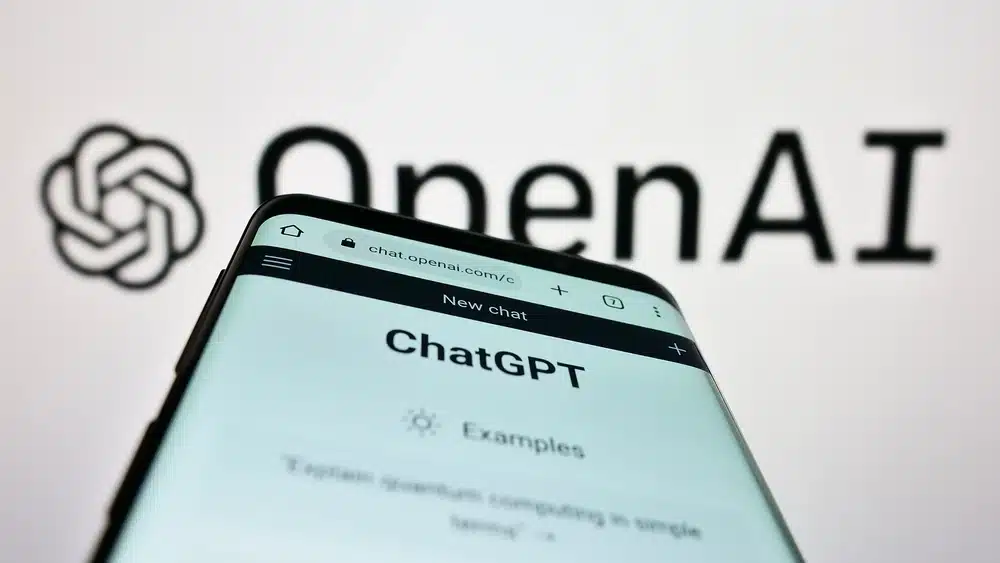Artificial Intelligence (AI) is reinventing the way we live and do business worldwide, from healthcare to finance to transportation. Programming languages used to create intelligent systems is a key aspect of AI development.
In this article, we’ll explore the best programming languages for AI, their unique features, and how to choose the right one for your projects.
What Are AI Programming Languages?
AI programming languages are tools that developers use to create algorithms and models capable of mimicking human intelligence. Whether it’s building neural networks or crafting predictive models, the choice of language will matter a lot to the success of your AI project.
Top Programming Languages for Artificial Intelligence
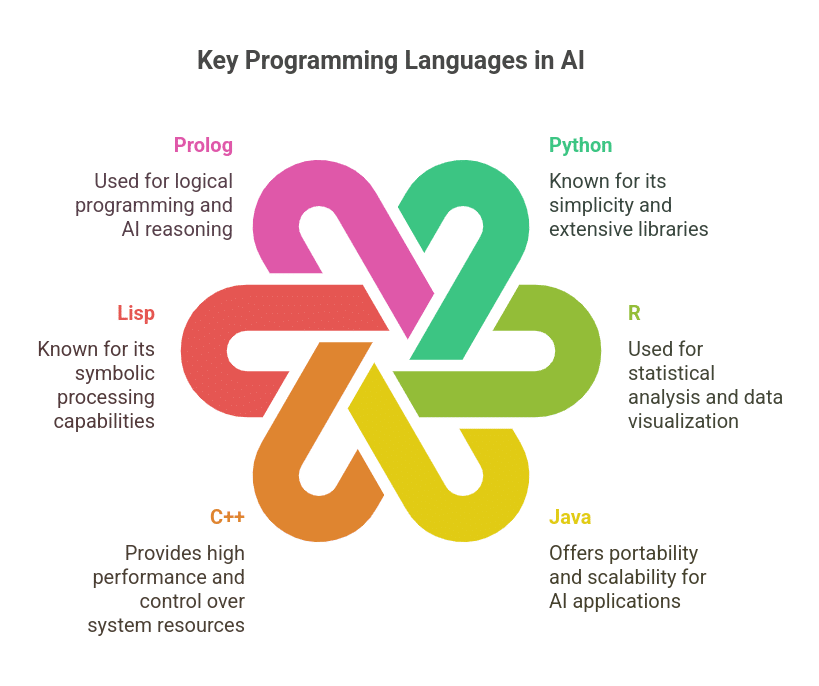
1. Python
Python is the go-to programming language for AI development due to its simplicity and extensive library support.
Detailed Features:
- Extensive Libraries: Includes TensorFlow, PyTorch, scikit-learn, and NLTK for various AI tasks like machine learning, natural language processing (NLP), and deep learning.
- Readable Syntax: Python’s simple syntax allows developers to focus on solving problems rather than worrying about language complexities.
- Cross-Platform Compatibility: Code written in Python runs seamlessly across multiple operating systems.
Popular Use Cases:
- Machine learning models for predictive analytics.
- NLP applications like chatbots and virtual assistants.
- Computer vision systems for facial recognition and object detection.
Learn Python for free with Great Learning’s Artificial Intelligence with Python course!
2. R
R is popular in AI development because of statistical analysis and visualization, which are required for data-centric AI projects.
Detailed Features:
- Statistical Capabilities: Tools for data manipulation, statistical modeling, and hypothesis testing that are robust.
- Data Visualization: ggplot2 and lattice provide unparalleled graphical capabilities, but libraries of this kind are available.
- Extensive Community Support: R has a large, active community that shares resources for data-driven AI applications.
Popular Use Cases:
- Predictive modeling in healthcare and finance.
- Creating complex statistical reports and data visualizations.
- Building recommendation systems based on customer data.
If you want to learn the statistical and visualization skills you need to become an expert in AI projects, enroll in our free Introduction to R Programming course. Perfect for beginners and professionals alike!
3. Java
Java is a very popular, widely used in enterprise-level AI applications. These applications require high performance and scalability.
Detailed Features:
- Platform Independence: Write once and run anywhere with Java Virtual Machine (JVM).
- Concurrency Support: Efficient multithreading capabilities for handling large datasets.
- Integration: Compatible with big data tools like Apache Hadoop and Spark.
Suggested Read: Why Java is Platform Independent?
Popular Use Cases:
- Building scalable chatbots and recommendation systems.
- AI-powered enterprise solutions, such as fraud detection.
- Real-time analytics and monitoring tools.
Enrol in our free Java Programming course to build a strong foundation in Java.
4. C++
C++ is renowned for its speed and efficiency, making it ideal for real-time AI applications and hardware-level programming.
Detailed Features:
- High Performance: Its close-to-hardware nature ensures faster execution of AI models.
- Memory Management: Allows developers to fine-grained control over system resources.
- Algorithm Optimization: Excellent for implementing complex AI algorithms.
Popular Use Cases:
- AI in gaming, such as decision-making for non-player characters (NPCs).
- Embedded AI in robotics and IoT devices.
- Simulation and modeling in scientific research.
Enrol in our free C++ for Beginners course to kickstart your journey in high-performance programming.
5. JavaScript
JavaScript is increasingly being used for AI, especially in web-based applications, all thanks to frameworks like TensorFlow.js.
Detailed Features:
- Client-Side Execution: AI models can run directly in web browsers, reducing server load.
- Compatibility: Integrates well with web technologies like HTML and CSS.
- Lightweight Frameworks: TensorFlow.js and Brain.js simplify AI development for web applications.
Popular Use Cases:
- Real-time data processing in web applications.
- AI-powered user interface enhancements, like autocomplete and sentiment analysis.
- Interactive educational tools using AI.
Enrol in our free JavaScript courses and explore how to build interactive web applications. Discover how JavaScript frameworks like TensorFlow.js enable AI-powered web solutions.
6. Prolog
Prolog, a logic-based programming language, is highly suited for artificial intelligence tasks that involve knowledge representation, reasoning, and decision-making. Its declarative nature makes it ideal for creating systems that require logical inference, such as expert systems and natural language processing tools.
Detailed Features:
- Declarative Syntax: The language deduces outcomes based on how relationships and rules are defined by the developer.
- Built-in Pattern Matching: It makes searching, manipulating data structures easier.
- Strong AI Focus: Designed specifically for applications like expert systems.
Popular Use Cases:
- Developing expert systems for diagnostics.
- Natural language understanding in virtual assistants.
- Knowledge-based reasoning for AI-driven databases.
7. Lisp
Lisp is one of the oldest programming languages still used in artificial intelligence development. It remains a strong choice for AI projects requiring advanced problem-solving and dynamic adaptability.
Detailed Features:
- Dynamic Typing: Offers flexibility in variable declarations.
- Macro System: Allows developers to create custom syntactic extensions.
- Adaptability: Excellent for rapid prototyping and experimentation.
Popular Use Cases:
- AI research and academic projects.
- Building adaptive AI systems that learn and evolve over time.
- Problem-solving systems in expert domains.
Emerging Programming Languages for AI
- Julia: Julia offers high performance for numerical and scientific computing, ideal for complex AI models.
- Scala: Scala is a functional programming language in support of big data driven AI applications.
- Rust: Provides memory safety and performance, becoming a strong candidate for large-scale AI projects.
How to Choose the Right Programming Language for AI
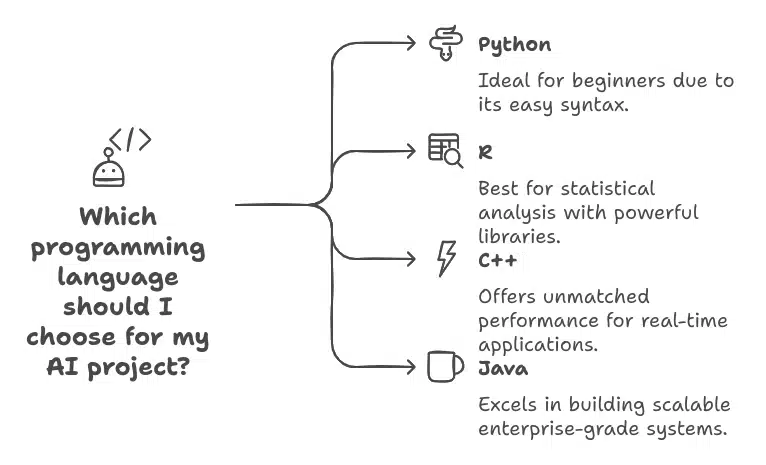
Selecting the best language depends on your project’s goals and your expertise.
- For Beginners: The syntax of Python is very easy to learn, and it is the easiest language to start with.
- For Statistical Analysis: R is the top choice due to its powerful libraries.
- For Real-Time Applications: C++ offers unmatched performance.
- For Scalability: Java excels in building enterprise-grade AI systems.
Ready to dive deeper into AI? Check out our free AI Courses and brush your hands on artificial intelligence concepts, tools, and programming languages.
To Learn AI development from scratch and in detail, consider looking at Great Learning’s PG Program in AI & Machine Learning in collaboration with UT Austin.
Frequently Asked Questions(FAQ’s)
1. Which programming language is best for beginners in AI?
Python is the best language for beginners in AI due to its simple syntax, extensive library support, and active community. It allows new developers to quickly learn and apply AI concepts without worrying about complex coding structures.
2. Do I need to learn several programming languages for my AI development?
While not strictly necessary, learning multiple languages can be beneficial. For example:
- Python for machine learning and NLP.
- R for statistical analysis.
- C++ for real-time or hardware-intensive applications.
3. Are there any open-source tools for AI development tied to specific languages?
Yes, many open-source tools are language-specific:
- Python: TensorFlow, PyTorch, scikit-learn.
- R: caret, ggplot2.
- Java: Weka, Deeplearning4j.
- These tools simplify AI development by providing pre-built modules and frameworks.
4. Can JavaScript be used for serious AI development, or is it limited to web-based applications?
JavaScript, particularly with frameworks like TensorFlow.js, is increasingly being used for serious AI applications. While primarily suited for web-based AI, it is evolving and can handle complex tasks like real-time data processing and client-side machine learning.
Also Read: Best Artificial Intelligence Projects Ideas
